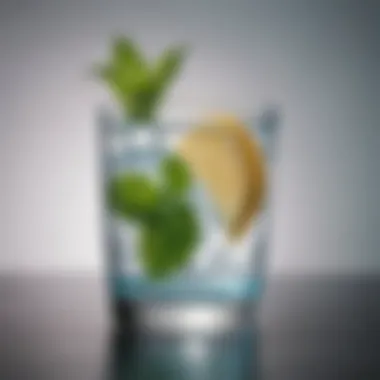Effective Remedies for Hangovers: A Complete Guide


Intro
Hangovers can be a difficult experience for many, leading to discomfort and distraction in daily activities. It is common to seek out ways to tackle this condition. Understanding various remedies combined with appropriate preventative strategies is necessary. This guide aims to bridge the gap between conventional wisdom and science-based options that might be effective. Both beauty enthusiasts and anyone may find these solutions applicable. Looking both at the different effects of hangovers and suggestions can help in quicker recovery.
Insider Beauty Tips
Tackling hangovers includes more than just physical remedies. The look and feel of your skin and hair also might suffer after a night out. Here are a few insider beauty tips that could aid not just recovery from a hangover but also boost a person's appearance post-event.
Beauty Hacks
In the moments after your hangover sets in, there are several simple tips to recover that appearance:
- Hydrate Yourskin: Use a good gel-based moisturizer to retain moisture after dehydration.
- Brighten Up: A vitamin C serum can add radiance back to tired skin.
- Cooling Masks: Consider using sheet masks to revitalize the complexion.
Skincare Tips
Establishing a proper skincare routine can go a long way toward mitigating some effects:
- Cleanse Well: Start with a gentle cleanser to lift any leftover makeup, dirt, and oil.
- Exfoliate: Light exfoliation can make the skin look fresh, in moderation.
- SSPF protection: Don’t forget a broad spectrum sunscreen if you go outdoors.
Haircare Secrets
After a nighttime outing, using specific hair methods could return bounce and shine:
- Rebalance Roots: Dry shampoo can be your best friend.
- Moisturize: A restoring hair mask replenishes those lost moisture levels.
- Tame the Frizz: Using leave-in conditioners help style stray hairs effectively.
Product Reviews
Selection of the right products can ease your subsequent hangover phases, boosting not only comfort but pleasure in use. Evaluating various options when reaching for your skincare or haircare products is essential.
Skincare Products
Some recommended products make a significant difference post-party.
- Fresh Rose Deep Hydration Face Cream: A pool of hydration invites shine.
- Clinique Moisture Surge 72-Hour Auto-Replenishing Hydrator: Known for its moisture lock capabilities.
Makeup Products
Makeup can cover up imperfections intensified by the aftermath of a hangover.
- Nars Radiant Creamy Concealer: Perfect for hiding under-eye circles and brightening complexion.
- Dior Backstage Face & Body Foundation: Light, dewy coverage suitable for any days.
Haircare Products
Using quality haircare helps restore hair quality and shine post-event:
- Olaplex No. 3 Hair Perfector: Known for rebuilding bond strength.
- Moroccanoil Treatment: Provides nourishment while protecting strands.
Makeup Trends
Keep these makeup trends in mind when preparing your appearance after those unavoidable hangover days. There are much strategies to conceal those rough patches, effortlessly combine fashion, and create illusions of coverage.


Latest Makeup Trends
Breaking down popular trends could offer insights:
- Natural Base: Embracing your inner shine through light surfaces can enhance your natural allure, presenting a refreshed version of yourself.
- Glossy Finish: Adding a touch of gloss on eyes or lips draws attention to the lively segments of your face.
Seasonal Makeup Looks
Adapting colors relevant to the season encourages creativity. Lights and festive tones mixed with natural could instill confidence and vibrancy.
Celebrity Beauty Inspiration
Many celebrities have effective methods for looking fantastic:
The Nature of Hangovers
Understanding the nature of hangovers is essential for devising effective remedies and prevention strategies. This segment delves into the fundamental aspects surrounding hangovers, shedding light on their definition, symptoms, and physiological basis.
What is a Hangover?
A hangover is a collection of symptoms that occur after the consumption of alcohol. It typically manifests the morning following heavy or prolonged drinking sessions. Although the exact cause is not fully understood, it is widely accepted that it occurs due to the impact of alcohol on the body.
The experience of a hangover can vary among individuals. For some, minor symptoms may develop, while for others, the effects can be quite debilitating. This variability highlights the importance of understanding hangovers, particularly for individuals who consume alcohol frequently.
Common Symptoms of Hangovers
Revisting the symptoms associated with hangovers helps in recognizing the condition quickly. They can include:
- Headaches: One of the most prevalent symptoms, headaches often result from dehydration and changes in blood flow. The cervical areas can tighten, causing tension headaches. Addressing these can significantly aid in quicker recovery.
- Nausea: Many experience feelings of nausea after drinking. This symptom, often linked to gastrointestinal disturbances, signals the body to reject foods that may worsen the condition. Understanding this allows for tailored dietary choices during recovery.
- Fatigue: Alcohol consumption disrupts sleep patterns, leading to fatigue as a consequence. A hangover induces a level of exhaustion that can affect daily activities. This long-lasting fatigue needs attention in recovery processes.
- Dehydration: Alcohol is a known diuretic. It encourages water loss, which leads to dehydration. This exacerbates hangover symptoms and emphasizes the necessity of hydrating before, during, and after drinking.
Hydrating after consuming alcohol is crucial for alleviating hangovers.
Physiological Causes of Hangovers
The physiological causes of hangovers can be quite complex and multifactorial. The breakdown of ethanol, the active ingredient in alcoholic beverages, results in acetaldehyde, a toxic byproduct. This compound can contribute to hangover symptoms as it interferes with metabolic processes.
Additionally, the influence of alcohol on neurotransmitters may alter mood and lead to irritability or anxiety. Furthermore, the inflammatory response the body mounts against alcohol consumption is linked with other symptoms. Understanding these causes is vital for addressing issues effectively.
By comprehending the nature of hangovers, individuals can equip themselves with the knowledge necessary for preventing and treating this condition. Identifying the real causes strengthens recovery measures and guides personal choices concerning alcohol consumption.
Preventing Hangovers
Preventing hangovers is a critical focus in any comprehensive guide about this topic. Identifying effective preventive measures can mitigate the physical discomfort one experiences post-drinking. When your strategy is to avoid hangovers altogether, it saves not just the physical toll but also mental clarity. Way less stress and the ability to enjoy social experiences more consistently greatly uplifts one's mental state.
Moderation in Alcohol Consumption
Moderation is key to Alcohol consumption. Sensible drinking habits significantly reduce the chances of ending the night with a headache and nausea. By restricting the number of drinks consumed, one essentially lowers the blood alcohol concentration. Furthermore, this controlled consumption allows the body's systems to better manage the effects of alcohol. Listening to one's body gears the pace of drinking in a good way, maintaining enjoyable and safe experiences.
Hydration Strategies
Hydration strategies form an important pillar in hangover prevention efforts. Alcohol dehydrates the body, making effective hydration a priority when consuming alcohol. Staying hydrated leads to improved energy levels and contributes to feeling better the following day.
Water Intake Before Drinking


Drinking water before consuming alcohol is a straightforward yet effective approach to preventing hangovers. This technique increases hydration upfront, counters some effects of alcohol, and equips the body with necessary fluids. Assessable benefits include reducing the likelihood of headaches and contributing to overall well-being. Remaining hydrated can play a pivotal role, especially for those who particularly dislike the negative effects of hangovers.
Electrolyte-Rich Beverages
Electrolyte-rich beverages can enhance hydration even further and provide necessary nutrients. Often utilized for sports recovery, single source drinks like Gatorade or a coconut-infused beverage contain the ions the body loses due to alcohol's diuretic effects. Their presence not only augments fluid retention but also promotes healthier bodily functions. Relying solely on water may not recover what's lost during extensive drinking; these beverages effectively optimize restoration.
Choosing the Right Type of Alcohol
Making thoughtful choices regarding the types of alcohol consumed can significantly influence hangover severity. Differentiating between clear and dark spirits often matters since clear liquors such as vodka and gin generally showcase lower impurities, potentially leading to milder hangover symptoms. Moreover, still wines might create less unfortunate aftereffects compared to their bubbly counterparts due to fermentation context. Hence, these conscious choices add another layer in mitigating such unwanted situations.
Immediate Remedies for Hangovers
Immediate remedies for hangovers are crucial to restoring comfort and well-being after alcohol consumption. When one faces a hangover, immediate alleviation is often the primary concern. Various factors can influence the severity of symptoms experienced, and prompt interventions can make a significant difference. The effectiveness of these remedies can vary, but they often aim to tackle the most common issues, such as dehydration and nutrient depletion, effectively combatting the aftereffects of drinking.
Rehydration Techniques
Proper hydration plays a vital role in the recovery process when one is suffering from a hangover. Dehydration occurs due to alcohol's diuretic effects, leading to fluid loss. This increase in urine production disrupts the balance of electrolytes in the body. Rehydration techniques can help to replenish lost fluids and nutrients effectively, allowing for quicker recuperation.
Hydration Solutions
Hydration solutions such as oral rehydration salts or sports drinks can restore electrolyte balance that has been disrupted by alcohol. These solutions are designed to rapidly replenish critical minerals such as potassium and sodium, which are essential for various bodily functions. They are beneficial choices because they deliver fluids along with electrolytes that toxic effects of alcohol often deplete. However, not all hydration solutions equally impact recovery, and sugar content may vary. Customized solutions, which take individual needs into account, can be even more effective.
Coconut Water
Coconut water has gained recognition as a natural alternative for rehydration. It contains essential electrolytes, most notably potassium, supporting hydration after drinking. Coconut water is low in calories and provides refreshing hydration without added sugars. Its natural composition makes it increasingly popular among health-conscious individuals. While coconut water works well for mild symptoms, it may not provide sufficient fluid replacement for severe dehydration experienced by others.
Nutritional Interventions
Nutritional interventions play an essential role in recovery from hangovers. Specific vitamins and nutrients can help mitigate the symptoms associated with hangovers. Incorporating nutrient-rich foods and supplements can aid in restoring energy levels and counteracting deficits created by alcohol consumption.
Vitamin and B Compounds
Vitamin C and B compounds, particularly B6 and B12, can assist in combating hangover symptoms. These vitamins are crucial for several bodily functions, including energy production and immune support. Vitamin B complex promotes metabolic pathways, allowing for better utilization of energy stores that often get depleted by alcohol. Their replenishment can help in reducing fatigue and cognitive impairment and boost overall well-being on the day after drinking. However, they are most effective when used alongside a balanced diet.
High-Protein Foods
High-protein foods contribute significantly to hangover recovery. Processed foods can cause inflammation and contribute to a slow recovery, while lean proteins help repair compounds broken down during drinking. Proteins from sources like chicken, eggs, and legumes assist in rebuilding lost nutrients. These food choices include amino acids that play crucial roles in brain function and energy levels. A breakfast with high-protein ingredients can become a powerful tool in an individual’s hangover support tactic, balancing nutrient needs with sustainable energy.
Over-the-Counter Medications
Over-the-counter medications can offer a straightforward approach to symptom relief. Common options include pain relievers such as ibuprofen or acetaminophen, often targeting headache relief. Understanding their proper usage is imperative, as each category of medicine comes with specific considerations. For example, combining excessive amounts of certain painkillers with alcohol can stress the liver, creating adverse effects worse than the hangover itself. While opportune, using these medications depends on recognizing their benefits and limitations.
Alternative Remedies
Alternative remedies can play significant role in managing hangover symptoms. Unlike conventional treatments, these approaches often come from various cultural and historical practices, providing a natural way to alleviate discomfort. Many people seek these options due to fewer side effects and a more holistic approach to health. They also reflect a growing trend among beauty enthusiasts and health-conscious individuals towards safer, less invasive treatments.
Herbal Solutions
Herbal medicine has been utilized for centuries, and its application for hangover relief is no exception. Many herbs are thought to possess properties that help the body recover from the aftereffects of alcohol. Here are some common herbs and their purported benefits:
- Ginger: Renowned for its effectiveness against nausea, ginger can calm the stomach when it feels distressed. Consuming ginger tea or supplements may alleviate some of the queasiness tied to hangovers.
- Milk Thistle: Often used for liver support, milk thistle may help regenerate liver cells damaged by alcohol consumption. Its active ingredient, silymarin, provides antioxidant effects, thereby potentially assisting in faster recovery.
- Peppermint: This herb is known for easing digestive discomfort. Drinking peppermint tea can be soothing and might help relieve headache or stomach pains arising after drinking.


However, one must consider possible interactions with other medications. Always consult a health professional before incorporating herbal remedies.
Acupressure and Acupuncture
Acupressure and acupuncture are two ancient practices rooted in Traditional Chinese Medicine. Both modalities target specific points on the body to achieve a balance of energy and restore health. They are believed to help manage hangover symptoms in several ways:
- Acupressure: This technique involves applying pressure to specific points such as PC6 (Pericardium 6) — which is thought to relieve nausea. Applying pressure with the fingers may enhance blood circulation and prolong the overall sense of well-being.
- Acupuncture: Similar to acupressure, this method utilizes fine needles inserted at specific points. Research has indicated that acupuncture might alleviate pain, reducing the severity of hangover headaches and distress in the stomach.
Both methods offer a remarkable option for individuals seeking a more balanced approach to recovery, although results may vary significantly between individuals.
Homeopathic Options
Homeopathy stands apart from both conventional and traditional remedies. It operates on the principle of
Long-Term Strategies for Hangover Management
Long-term strategies for hangover management are essential for anyone seeking to far alleviate the distress associated with hangovers. Unlike immediate remedies, which may offer temporary relief, adopting a proactive approach can significantly reduce the frequency and severity of future hangovers. This consideration is not only practical but can also lead to a change in lifestyle that promotes overall well-being.
Developing a Healthy Lifestyle
A healthy lifestyle is fundamental in minimizing hangover impact. Nutrition plays a key role here. Proper meal planning and making informed choices can help substantially. Foods rich in vitamins and minerals, such as fruits and vegetables, are beneficial. Incorporating whole grains and lean proteins into the diet is another step. These provisions provide essential nutrients that help the body recover more efficiently.
Additionally, regular exercise can't be overlooked. Moderate physical activity supports circulation and digestion while improving general mood. Furthermore, sufficient sleep helps in recovery processes, making it less likely for someone to suffer severely from hangovers.
Building Tolerance to Alcohol
When discussing tolerance to alcohol, it is a topic that must be approached with caution. Gradually increasing alcohol consumption can sometimes allow the body to adapt, potentially mitigating the effects of drinks over time. However, this matters greatly depending on personal health conditions and individual body reactions, which are very important to monitor.
Some studies suggest that consuming alcohol with food or pacing oneself through drinks can be more effective. Ultimately, this is about finding a balanced approach. It's also essential to remain tranparent with oneself about drinking habits.
Understanding Personal Limits
Knowing one’s limits with alcohol is crucial for long-term hangover management. Each individual has varied thresholds for tolerating alcohol. Listen to body signals; signs indicate when enough has been consumed. Maintaining an awareness of one’s response to drinks can be the difference between a night out and the aftermath feeling extremely unwell.
Documenting experiences of drinking can help in recognizing trends. Understanding hydration needs and food consumption before drinking are useful strategies for gauging one’s personal threshold. Building this self-awareness is ultimately beneficial. Greater awareness leads to healthier choices before indulging.
Regarding the nature and science of hangovers, each person's experiences are unique and personal. Self-knowledge remains vital for effectively managing hangover responses and promoting personal health.
End
Understanding hangovers, their causes, symptoms, and remedies is essential for promoting overall well-being, particularly for those who enjoy social drinking or who may encounter occasional indulgence during lively gatherings. Acknowledging the significance of effective hangover management allows individuals to minimize discomfort and accelerate recovery.
Summarizing Key Points
In summary, the article has explored several pects of hangover management, including:
- The definition and symptoms of hangovers, emphasizing issues such as headaches, fatigue, and anxiety.
- Preemptive measures that include staying hydrated and choosing specific types of alcohol to limit hangover severity.
- Immediate remedies, notably rehydration techniques using water and electrolyte-rich options like coconut water.
- Alternative methods, detailing herbal solutions and holistic practices such as acupuncture.
- Long-term strategies, which encompass building tolerance to alcohol, creating a healthy lifestyle, and understanding personal consumption limits.
This comprehensive guide aims to address both short-term relief and long-term strategies, equipping readers with valuable knowledge to navigate their next social experience confidently.
Future Considerations
Looking ahead, attention should be given to the evolving understanding of hangovers and their effects. In future research, there could be advancements in:
- The development of new supplements or beverages designed to prevent hangovers before they occur.
- Increasing public diagnostics on emotional and physical responses to alcohol intake, enhancing awareness surrounding personal limits.
- Promotions aimed at behavioral changes to foster healthier drinking habits may become increasingly relevant.
Overall, readers are encouraged to integrate these perspectives for proactive and insightful management of hangovers, assure their health consciousness, and create more enduring habits that minimize the negative impacts associated with alcohol consumption.
"There is no stricter test of a person's intelligence than their choice of income level. They may not be able to control any one drink, but an educated response assists greatly beyond the actual affect itself." - Anonymous







